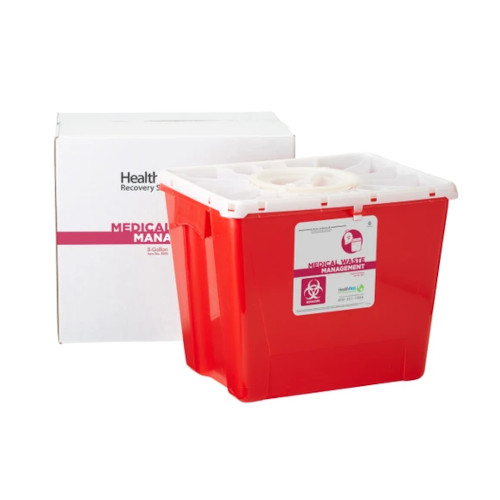Environmental Responsibility: The Eco-Friendly Method to Medical Waste Disposal
Environmental Responsibility: The Eco-Friendly Method to Medical Waste Disposal
Blog Article
The Relevance of Proper Waste Disposal Practices
The administration of waste is an important element of environmental stewardship that usually goes unnoticed in our day-to-days live. Appropriate waste disposal techniques are not just an issue of benefit however are vital for protecting our ecosystems and public wellness. From the consequences of improper garbage disposal on our setting to the lasting effects for future generations, the relevance of taking on sustainable waste administration practices can not be overemphasized. By exploring the environmental impact of irresponsible garbage disposal, the benefits of reusing initiatives, and the value of area engagement in waste decrease initiatives, a deeper understanding of why appropriate garbage disposal practices are vital arises.
Ecological Impact of Improper Disposal
Incorrect disposal of waste presents a substantial threat to the environment because of its damaging results on ecosystems and human health. When waste is not correctly handled, it can lead to contamination of the air, water, and dirt, creating harm to numerous plant and pet varieties. click here. Chemicals and toxins from poorly disposed waste can seep into the ground, contaminating groundwater sources and impacting the health and wellness of both wildlife and people
Furthermore, the accumulation of waste in garbage dumps creates greenhouse gases like methane, adding to environment modification and worldwide warming. Inappropriate disposal practices also result in littering, which not just degrades the visual value of the setting however can likewise hurt wild animals with consumption or complexity.
To alleviate these environmental effects, it is vital for people and neighborhoods to adopt proper garbage disposal methods such as reusing, composting, and accountable dangerous waste disposal. By taking these steps, we can aid protect ecosystems, maintain natural deposits, and protect human health for current and future generations.
Benefits of Recycling Programs
Routinely participating in recycling programs offers many advantages for both the setting and society as a whole. This conservation of resources not just assists in maintaining eco-friendly balance yet additionally adds to lasting development.
Additionally, recycling plays an important duty in reducing power intake and greenhouse gas discharges. The manufacturing of items from recycled materials usually requires less energy compared to producing from virgin sources - medical waste removal near me. Therefore, the carbon footprint connected with the manufacturing procedure is considerably reduced, assisting in the fight versus climate modification
In addition, reusing programs create task possibilities in the recycling sector, promoting economic development and social welfare. By urging the recycling and reuse of products, these programs support a round economic climate that decreases waste generation and maximizes resource effectiveness, inevitably bring about a cleaner, greener future for generations to come.
Hazardous Waste Administration Standards
Applying effective contaminated materials management guidelines is vital for reducing ecological and health threats related to the improper disposal of unsafe materials - click here. Correct handling, treatment, and disposal of unsafe waste are essential to stop contamination of soil, water sources, and air
One key standard is proper labeling of hazardous waste containers to guarantee safe handling and transportation. Additionally, centers must comply with strict storage requirements to stop leaks, spills, or accidents that could endanger human health and wellness and the atmosphere. Routine training programs for workers on harmful waste monitoring methods are likewise important to ensure conformity with policies and promote a society of safety and security.
Moreover, hazardous waste must be segregated based on its residential properties to protect against chemical reactions that could bring about dangerous situations. Executing a detailed waste monitoring system can assist keep track of the movement of unsafe materials from generation to disposal, making sure transparency and accountability. By adhering to these standards vigilantly, organizations and sectors can add to a safer and cleaner atmosphere for present and future generations.
Neighborhood Participation in Waste Decrease
To successfully address the ecological and health threats associated with unsafe waste monitoring, involving the area in waste reduction efforts is paramount. Neighborhood participation plays a crucial function in advertising sustainable waste administration techniques and promoting a society of environmental obligation. By enlightening residents about appropriate waste partition, recycling, and composting methods, areas can considerably lower the amount of waste sent to land fills, thus minimizing environmental air pollution and conserving all-natural sources.
Neighborhood engagement in waste reduction programs likewise aids in raising understanding concerning the significance of waste reduction and encourages people to take on green routines in their lives - medical waste removal. Collective efforts in between local authorities, waste management companies, and community participants can lead to the implementation of effective waste reduction approaches tailored to the specific demands of each neighborhood or community
Moreover, community engagement cultivates a sense of possession and liability amongst citizens, encouraging them to take aggressive actions towards decreasing waste generation and advertising a cleaner, healthier atmosphere for future and existing generations. By functioning together in the direction of usual waste reduction goals, neighborhoods can make a substantial influence on mitigating the adverse impacts of incorrect garbage disposal techniques.

Future of Sustainable Waste Practices
The advancement of sustainable waste practices is crucial for progressing environmental stewardship and resource preservation in the coming years. As the global population remains to grow, so does the quantity of waste generated (medical waste disposal). Standard garbage disposal methods, such as landfilling and incineration, are no more lasting in the long term as a result of their significant environmental influences. Relocating forward, the future of lasting waste practices hinges on embracing a round economy strategy, where resources are reused, reused, or repurposed to reduce waste generation.
Technical innovations play a key role fit the future of lasting waste practices. Advanced waste sorting and recycling technologies can assist enhance the effectiveness of waste administration processes, permitting the recuperation of useful sources from waste streams. Furthermore, the fostering of eco-friendly products and composting techniques can help in reducing the quantity of organic waste ending up in garbage dumps, thus reducing greenhouse gas emissions.
Furthermore, advertising customer understanding and education and learning on correct waste segregation and disposal methods is vital for driving behavioral change in the direction of sustainability. By promoting a culture of waste decrease, recycling, and reuse, areas can collectively add to a cleaner and much healthier atmosphere for future generations.

Conclusion
Finally, proper garbage disposal techniques are vital for reducing ecological influence and promoting sustainability. By carrying out reusing programs, managing harmful waste effectively, and encouraging area involvement in informative post waste reduction initiatives, we can function in the direction of a cleaner and healthier atmosphere. It is necessary for governments, businesses, and individuals to prioritize sustainable waste practices for the future well-being of our world.

From the consequences of incorrect waste disposal on our environment to the long-term implications for future generations, the importance of adopting lasting waste management practices can not be overemphasized. By discovering the ecological effect of careless waste disposal, the benefits of reusing campaigns, and the significance of area engagement in waste decrease efforts, a deeper understanding of why proper waste disposal practices are important emerges.
By enlightening residents about proper waste partition, recycling, and composting techniques, areas can significantly reduce the quantity of waste sent to landfills, therefore lessening environmental air pollution and saving natural sources. (click here)
Relocating onward, the future of sustainable waste practices lies in embracing a circular economic situation strategy, where sources are recycled, reused, or repurposed to decrease waste generation.
Advanced waste sorting and reusing modern technologies can assist enhance the effectiveness of waste management processes, allowing for the recovery of beneficial sources from waste streams.
Report this page